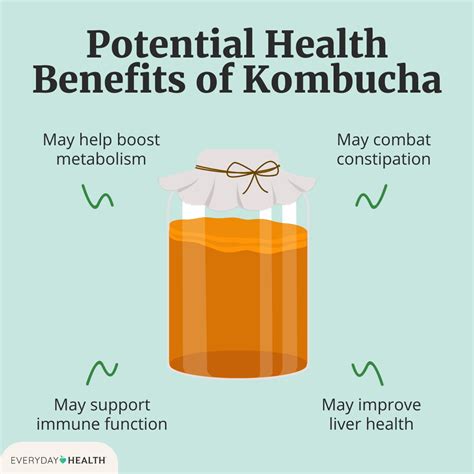Intro
Discover 7 Kombucha health benefits, including probiotics, antioxidant-rich properties, and detoxification, boosting immune systems, energy, and gut health, while reducing inflammation and improving overall wellbeing.
Kombucha, a fermented tea drink, has been gaining popularity in recent years due to its potential health benefits. The drink is made by adding a symbiotic culture of bacteria and yeast, known as a SCOBY, to sweetened black or green tea. As the mixture ferments, it creates a fizzy, tangy beverage that is rich in probiotics, antioxidants, and other beneficial compounds. With its unique taste and numerous health benefits, kombucha has become a staple in many health-conscious households. In this article, we will delve into the world of kombucha and explore its seven key health benefits.
The origins of kombucha date back to ancient China, where it was consumed for its medicinal properties. Today, the drink is enjoyed globally, with many people swearing by its ability to boost energy, improve digestion, and even support weight loss. While some of the claims surrounding kombucha may be anecdotal, there is a growing body of scientific evidence to support its potential health benefits. From reducing inflammation to supporting immune function, kombucha has been shown to have a positive impact on overall health and wellbeing.
As we explore the health benefits of kombucha, it's essential to note that the drink is not a cure-all, and more research is needed to fully understand its effects on human health. However, for those looking to incorporate a healthy, fermented beverage into their diet, kombucha is definitely worth considering. With its unique flavor profile and numerous health benefits, it's no wonder why kombucha has become a favorite among health enthusiasts. So, let's dive into the seven key health benefits of kombucha and explore what makes this fermented tea drink so special.
Kombucha and Gut Health

How Kombucha Supports Gut Health
The probiotics in kombucha work by colonizing the gut with beneficial bacteria, which can help to crowd out pathogenic bacteria. This can lead to a range of benefits, including improved digestion, reduced inflammation, and a stronger immune system. Additionally, the antioxidants in kombucha may help to reduce oxidative stress in the gut, further supporting gut health.Kombucha and Immune Function

The Role of Beta-Glucans in Kombucha
Beta-glucans are a type of polysaccharide that is found in the cell walls of yeast and bacteria. They are known for their ability to stimulate the immune system, increasing its ability to fight off pathogens. The beta-glucans in kombucha may help to activate immune cells, such as macrophages and natural killer cells, which can help to reduce the risk of illness.Kombucha and Inflammation

The Anti-Inflammatory Effects of Kombucha
The anti-inflammatory effects of kombucha are thought to be due to its high antioxidant content. Antioxidants can help to reduce oxidative stress, which is a key driver of inflammation. By reducing oxidative stress, kombucha may help to alleviate inflammation and reduce the risk of chronic disease.Kombucha and Cancer Prevention

The Potential Anti-Cancer Effects of Kombucha
The potential anti-cancer effects of kombucha are thought to be due to its high antioxidant content. Antioxidants can help to protect cells from damage, reducing the risk of cancer. Additionally, the probiotics in kombucha may help to support the health of the gut microbiome, which is thought to play a role in cancer prevention.Kombucha and Weight Loss

The Potential Weight Loss Effects of Kombucha
The potential weight loss effects of kombucha are thought to be due to its high probiotic content. Probiotics can help to support gut health, which is thought to play a role in weight management. Additionally, the antioxidants and polyphenols in kombucha may help to reduce inflammation, which is associated with obesity.Kombucha and Energy Boost

The Potential Energy-Boosting Effects of Kombucha
The potential energy-boosting effects of kombucha are thought to be due to its high probiotic and antioxidant content. Probiotics can help to support gut health, which is thought to play a role in energy production. Additionally, the antioxidants in kombucha may help to reduce oxidative stress, which can contribute to fatigue.Kombucha and Mental Health

The Potential Mental Health Benefits of Kombucha
The potential mental health benefits of kombucha are thought to be due to its high probiotic and antioxidant content. Probiotics can help to support the health of the gut-brain axis, which is thought to play a role in mental health. Additionally, the antioxidants in kombucha may help to reduce inflammation, which is associated with mental health disorders.What is kombucha and how is it made?
+Kombucha is a fermented tea drink that is made by adding a symbiotic culture of bacteria and yeast to sweetened black or green tea. The mixture is left to ferment for several days, creating a fizzy, tangy beverage that is rich in probiotics, antioxidants, and other beneficial compounds.
What are the health benefits of kombucha?
+Kombucha has been associated with a range of health benefits, including supporting gut health, immune function, and energy production. It may also have anti-inflammatory and anti-cancer properties, although more research is needed to confirm this.
How do I make kombucha at home?
+To make kombucha at home, you will need a SCOBY, sweetened black or green tea, and a fermentation vessel. You can purchase a SCOBY online or obtain one from a friend who brews kombucha. Once you have your SCOBY, simply add it to the sweetened tea and let it ferment for several days. The longer it ferments, the stronger the flavor will be.
Is kombucha safe to drink?
+Kombucha is generally considered safe to drink, although it may not be suitable for everyone. People with weakened immune systems or certain health conditions should consult with a healthcare professional before consuming kombucha. Additionally, kombucha can be contaminated with bacteria or other pathogens if it is not brewed properly, so it's essential to follow proper brewing and handling techniques.
Can I drink kombucha every day?
+While kombucha can be a healthy addition to a balanced diet, it's not necessary to drink it every day. In fact, overconsumption of kombucha can lead to an imbalance of gut bacteria, so it's best to drink it in moderation. A good starting point is to drink 4-8 ounces of kombucha per day and adjust as needed.
As we conclude our exploration of the seven key health benefits of kombucha, it's clear that this fermented tea drink has a lot to offer. From supporting gut health and immune function to reducing inflammation and promoting energy production, kombucha is a versatile beverage that can be a valuable addition to a healthy lifestyle. Whether you're looking to boost your energy, support your immune system, or simply enjoy a delicious and refreshing drink, kombucha is definitely worth considering. So why not give it a try and experience the benefits of kombucha for yourself? Share your thoughts and experiences with kombucha in the comments below, and don't forget to share this article with your friends and family who may be interested in learning more about this amazing fermented tea drink.
